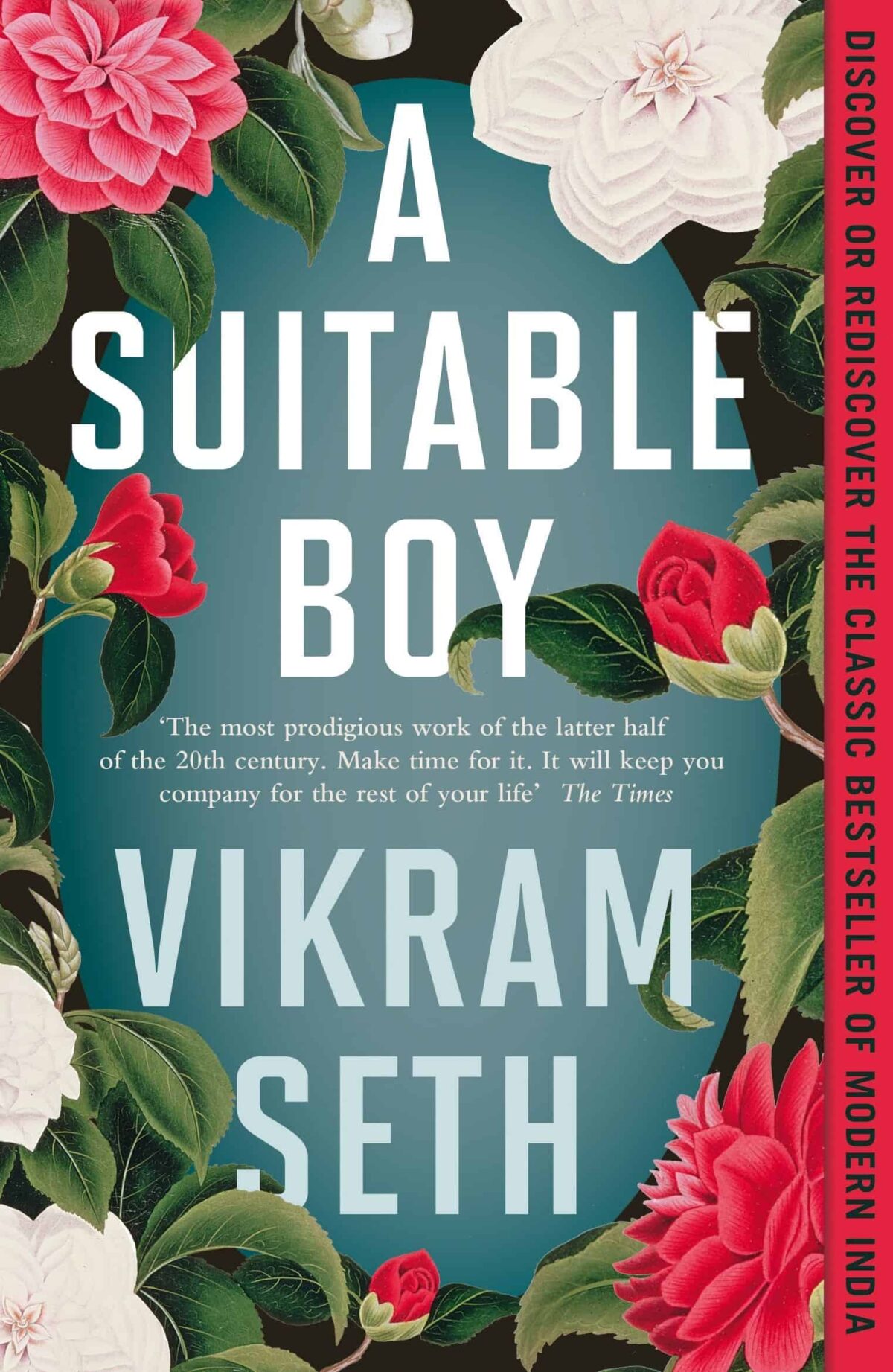My introduction to Vikram Seth was through his collection of poems The Humble Administrator’s Garden and All You Who Sleep Tonight. I had never read anything like this. On one level the poems looked deceptively simple, so much so that after reading them you felt that you could write such poems easily. Some poems were like paintings, capturing a moment. Then I read Beastly Tales that was a riot. Ten poems based on folk tales from India, China, Greece and Ukraine. Each tale has two animals – cat and hen or crocodile and monkey and is full of words, sounds and rhythms that leave you spellbound.
Then I came across The Golden Gate. I was astounded to know that it was a novel in verse, based on Eugene Onegin by Alexander Pushkin. Based on Californian lives, Gore Vidal has praised this work as ‘The Great California Novel.’ Later, when I learnt that Vikram mastered the Chinese language in one year and translated The Three Chine Poets, I was convinced that this was a genius at work.
I still had not read any prose by Vikram Seth. I had great hopes from An Equal Music but for some reason could not connect to it. I am not sure why but I was unmoved by it. Some authors are known for their best works – Herman Melville for Moby Dick or John Steinbeck for Grapes of Wrath. Vikram Seth is best known for his magnum opus A Suitable Boy. Once I had the heavy volume in my hands, I decided to take the plunge and started reading.
Year 1951. The first page describes marriage ceremony of Rupa, daughter of Mrs. Mehra. Mrs. Mehra tells her younger daughter Lata, “You will marry the boy that I choose.” This sentence is the essence of A Suitable Boy but the story is so much more than finding a groom for Lata.
The tale involves four families – the Mehras, the Kapoors, the Khans and the Chatterjis. Mrs. Rupa Mehra, her four children – Arun, Savita, Lata, Rupa; Mahesh Kapoor and Mrs. Kapoor have three children – Pran, Veena and Maan; the Khans who are the Nawabs of Baitar have three children – Zainab, Imtiaz and Firoz; and finally five children of Justice Chatterji and Mrs. Chatterji – Amit, Meenakshi, Dipankar, Kakoli and Tapan. Arun Mehra and Meenakshi Chatterji are married and so are Pran Kapoor and Savita Mehra. Maan Kapoor and Firoz Khan are best friends as are their fathers, Mahesh Kapoor and Nawab Sahib.
Are you lost? These are just the main characters. In supporting cast we have Mrs. Mehra’s father Dr. Kishanchand Seth and his second wife Parvati, Veena’s husband Kedarnath Tandon and their son Bhaskar and Veena’s friend Priya, Rupa Mehra’s friend Kalpana. Mahesh Kapoor who is also the Minister of Revenue has colleagues – S. S. Sharma who is also the Chief Minister and the Home Minister Agarwal who is Mahesh Kapoor’s opponent. Then there is the courtesan Saeeda Begum, her sister Tasneem, maid Bibbo, renowned singer Ustad Majeed Khan, Sarangi player Ishaq, Urdu teacher Rasheed. Lara’s best friend is Malati, Pran Kapoor who is a lecturer in English Department has a senior Prof. Sharma, a friend in Mathematics Department Sunil Patwardhan. Sunil’s senior professor is Durrani and he has a son Kabir. And last but not least, in a special appearance – Pandit Jawaharlal Nehru.
It is often said about Leo Tolstoy that his characters are hard to remember. Vikram Seth is just the opposite. As you read, each character with all his features appears in front of your eyes. What’s remarkable is Vikram never describes his characters in detail – height, skin colour, facial marks, unlike some authors who describe each character as if they are talking to a sketch artist to help him draw the picture of an escaped criminal. A Suitable Boy describes a character very rarely and the reader has full freedom to imagine the characters as he likes. I did not realise this at first but as I progressed through the novel, some characters appeared as if by magic. Mahesh Kapoor is Balram Jakhar wearing a black suit, Mrs. Rupa Mehta is Deena Pathak from Golmaal, Amit Chatterji is Dhritiman from the 1970 Satyajit Ray film Pratidwandi, Pran Kapoor is Dinesh Thakur from Rajnigandha, Kedarnath Tandon is Pradip Mukherjee from Jan Aranya and so on. Vikram has this amazing knack of guessing what’s going on the reader’s mind. On the first page, one is reminded of Jane Austin’s Pride and Prejudice and few pages later, we get a reference to the author when Lata is reading Emma. The description of Priya’s servant is short but memorable because he has the habit of stealing medicines. You say to yourself, this is just like Charles Dickens and on the next page you have a reference to Uriah Heep. It’s as if Vikram is saying, dude, I have read all those books and I know what I am doing. I feel chagrined and resume reading.
The period of the novel has been chosen very carefully. It’s four years after Indian’s independence. First elections of independent India were held in the same year. The story references some of the issues faced by the them parliament. These include The Hindu Code Bill that granted equality rights to women, the Zamindari Abolition Bill that ended the Zamindari system. The Centre had granted rights to each state for enacting Zamindari Abolition Bill. The story of A Suitable Boy takes place in a town called Brahmapur in the fictitious state of Purva Pradesh. Revenue Minister Mahesh Kapoor introduces the Zamindari Abolition Bill but after it comes into effect, it becomes clear that his close friend, Nawab Sahib of Baitar will lose all of his property. The tension between these two as a result forms a dominant part of the story. There are petitions filed claiming that the bill is against Constitution of India. Another issue involves construction of a Shiva temple in the main square of Brahmapur that is adjacent to a mosque and creates tension between the Hindu and the Muslim communities. A Suitable Boy was published in 1992 and clearly refers to the Babri Mosque incident that happened in 1991.
In 1951, serious differences of opinion arose between Prime Minister Nehru and Congress President Purushottam Das Tandon. After independence, Nehru resigned from the post of the party president as he felt that the posts of party president and Prime Minister should not be held by one person. Meanwhile Rafi Ahmed Kidwai, Maulana Azad and Acharya Kripalani opposed views held by Tandon on the issues of minorities and economy and resigned to form a separate party. Conflict between Nehru and Tandon reached its peak and at one time it seemed that Nehru may leave the party. Finally he prevailed and since then it became an unwritten rule that the posts of the party president and the Prime Minister should be held by the same person. In the novel, Mahesh Kapoor joins the party of Maulana Azad and Kripalani. Normally, in historical novels a disclaimer is added claiming that the story is based on historical events but the characters are imaginary. No such disclaimer can be seen in A Suitable Boy which raises the question. Is the character of Mahesh Kapoor based on a leader from post-independent India. And what was the need to make Brahmpur and Purva Pradesh imaginary?
It’s a fact clear as the day that Vikram is a born poet. He does not forget poetry even while writing prose. The acknowledgment of A Suitable Boy is a poem. In the contents section, the excerpt of each chapter is in the form of a two line poem. In the story, Amit Chatterji is a poet and he reflects much of Vikram’s own character. Amit writes a beautiful poem called ‘The Fever Bird’ that bears the undeniable stamp of Vikram Seth. In contrast, the poets in the meeting of the Literary Society write horrible poems based on terrible rhyming. Out is these, a poem of 29 stanzas based on independence of India takes the cake – “Mahatma came to us like summer ‘aandhi’, Sweeping the dungs and dirt, was M. K. Gandhi.” This raises an interesting question. Was writing such pathetic poems easy or difficult for Vikram? Also in acknowledgement is a warning in verse, “Buy me before your good sense insists, You’ll strain your purse and sprain your wrists.”
In the Chatterji family, as everyone gathers at the breakfast table, Justice Chatterji rules on important issues such as who will get the car for the day. Kuku aka Kakoli uses the car so much that a new phrase has been created in the family, “The car has been kuku’d.” This family has another idiosyncrasy. Amit, Meenakshi, Kakoli and Tapan composing couplets. This is reminiscent of the Hindi movie Khubsoorat where the characters played by David, Rekha and her sister find Radeef and Quafia in every sentence. In the Chatterji family, this tradition was started by Amit but very soon Kakoli became such an expert that her couplets were called ‘Kakoli couplets.’ (Morning bathing in the Ganga, Guaranteed to make you younger.’) Vikram said that many of the characters in A Suitable Boy are based on real persons with names changed. Only his dog Cuddles appears with his original name. (‘Because he can’t sue.’)
While describing the Chatterji children, sentences like “None of them worked, but each had an occupation” flow easily from Vikram’s pen. Many chapters have a last sentence that makes you stop and think. Reading such sentences feels like reading a Haiku where the last sentence completely changes the meaning. Like a painter, while finishing his painting, makes a small change with his last brushstroke that changes the scene. At other times, the sentences serve as a Coda in Western Classical Music, that denotes the end of a movement.
It feels as if the tone of A Suitable Boy is mostly satire. Barring few sad scenes, the narrator slowly uncovers the anomalies, the absurdities, sometimes in a serious manner, at other times playfully. When it is decided that the Shiva temple will be built next to the mosque, Ustad Majid Khan becomes uneasy while doing his Riyaz. The temple is on the south side of the mosque which means that everyday while offering Namaaz he will have to bow down to the God of the Quaafirs. But he does not realise that the Bhairav raga that he practices everyday is a homage to Lord Shiva. Before the elections Pandit Nehru talks about the Korean Crisis or problems in Egypt to a crowd of villagers in Salimpur who have never even gone to Brahmpur. Working at a high post in the multinational company Benson and Price, Arun is well versed about London even though he has never been there. Ignoring our elections completely, he and his colleagues take great interest in discussing whether Churchill will be re-elected.
Hemingway was known for his short sentences while Dickens specialised in long descriptions. Vikram Seth tells the story in such a simple and straightforward manner that one never thinks about his style of writing. While reading these 1,349 pages, I had to look up the dictionary only once. A beautiful word, acrostic meaning a poem that contains a secret message or puzzle if you choose certain letters from each line. How does Vikram manage to create this beautiful universe using simple words? Another interesting feature of the novel is the level of details. From the leather industry in Brahmpur to the similarities between the 14th article of the Indian Constitution and the 14th Amendment of the US constitution, every topic is described thoroughly. A Suitable Boy is a window into the life in post-independent India. Khushwant Singh, who lived through this era, could not find a single mistake in the novel regarding the details. Interestingly, Vikram was born in 1952, after the period when A Suitable Boy supposedly happens.
This poses an interesting question. Why 1951? The four families in A Suitable Boy are well-to-do but they had to suffer the consequences of partition. The Kapoors came to India from Lahore risking their lives and this comes up from time to time. Pran Kapoor has scars on his hands from the attacks during the journey to India. Move the period of the novel to four years earlier and you would have an epic drama of people fighting for their lives during partition. Vikram deliberately chose not to do that. In 1951, Mrs. Rupa Mehra is worried about Lata’s marriage or Varun’s career, which are not hardly the matters of life and death.
One cannot but help remember Leo Tolstoy’s Anna Karenina that starts with the famous sentence, “Happy families are all alike; every unhappy family is unhappy in its own way.” Sad, tragic tales have always been considered to carry more weight compared to lighter, happier tales. Vikram Seth deliberately goes against this tradition. Instead of focusing on people facing famine, partition or migrant crisis, he chooses to focus on little problems that each one of us faces in our everyday lives. After reading A Suitable Boy, I started to question that famous sentence of Tolstoy that I had hitherto accepted unconditionally. Can there be such a thing as a 100% happy family? Why are tales of extreme poverty an indicator of literary value? If literature is a reflection of our lives, what’s wrong with searching for human behaviour in comparatively happier times?
Why is A Suitable Boy so mesmerizing? We all have encountered our own versions of Mrs. Rupa Mehra and Amit Chatterji. So why should their stories be so interesting? Perhaps James Wood put it best when he wrote about A Suitable Boy, “Such writing reminds us that there are secrets beyond technique, beyond even style, which have to do with a quality of soul on the part of the writer.”
A Suitable Boy is now adapted for BBC by Mira Nair and streaming on Netflix. Looking forward to watching it.


